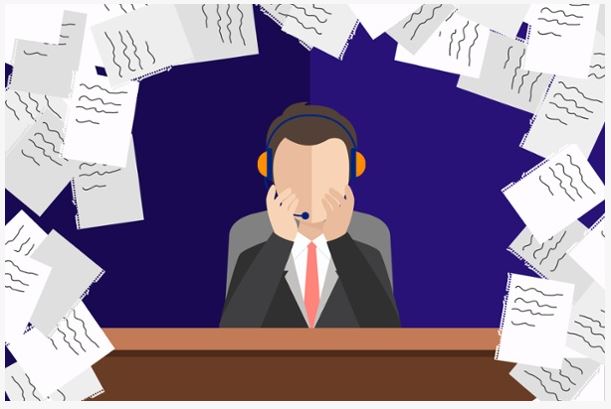
-
02 Mar
-
How Do Workloads Affect Customer Service in Your Call Center?
One factor causing stress in the workplace is an overwhelming workload, and it’s a concern in call centers. Customer service agents can become inundated with support requests, follow-up calls to make, emails to respond to, reports to process and more.
In sales- and target-driven environments, the drive to hit goals only adds to the pressure, leaving agents both worried about their performance as well as the amount of work they have to do to stay on-track.
Worse still, exhausted and frustrated service agents are unlikely to deliver the finest customer experience. By failing to plan and manage your employees’ workloads effectively, you could be risking the quality of your customer service, your reputation — and your business’s future.
How do workloads affect customer service, and what can be done to manage them better?
Fluctuating Productivity
The workload imposed on customer service agents can vary from one call center to another, and from one day to the next.
Teams representing a global business with millions of customers will obviously handle a greater number of interactions than a startup with a modest audience. Busy times and quieter periods may occur too, rather than a consistent flood of calls or live chats.
Those call centers processing hundreds or thousands of calls each day will have larger workloads, and productivity may suffer as agents struggle to meet demand. And there’s a knock-on effect: they could end up rushing through interactions in an effort to boost their productivity, providing weaker customer service than they perhaps should.
Consumers increasingly look for a more personalized experience, and every business should be catering to them as best they can given that it has the power to boost revenue. Customers who feel the agent is failing to meet their needs because they’re in a hurry to answer the next call may vote with their dollar and go elsewhere.
Team leaders overseeing groups of agents must liaise with managers to prevent staff getting overworked. Employees should be given the chance to provide feedback on their work experience in an honest, informal way.
This not only minimizes the risk of burnout and resentment, but ultimately means management is better-equipped to make positive changes.
After-call Work Might Suffer
After-call work is a core aspect of good customer service. Your agents don’t just jump from one interaction to another: they have to perform certain administrative tasks too.
This includes updating your CRM with changes in customer details or placing notes for future reference, gathering data for reports and more. This can be time consuming, and poor workload-management may leave agents struggling to fit this in.
As a result, mistakes could be made, important information might go unlogged and customer experiences may suffer. Software designed to automate administrative tasks where possible is incredibly helpful in streamlining these duties.
Interference with Quality Assurance
A quality assurance program helps call centers pinpoint flaws in their working methods, take steps to correct them and deliver a higher standard of customer service overall.
You may hire one or more QA analysts to undertake this process. They will be responsible for monitoring customer interactions, liaising with managers and team leaders to organize coaching / training, and other duties as required.
But their workload must be manageable to avoid the same problems overworked service agents can experience too.
The size of your workforce will affect the amount of employees QA analysts must monitor and deal with. If there’s simply too much for an understaffed QA team to do, there’s a bigger risk of oversights and missed opportunities.
Again, good software is pivotal to help QA analysts work to the best of their abilities and minimize disruption.
How to Manage a Heavy Workload Effectively
Want to know how to manage workload of employees? Let’s take a look at a couple of helpful ideas.
Forecasting workloads
Managing a heavy workload is difficult, but can be made simpler by forecasting workloads.
This process is based on gathering data, assessing it and calculating what future demand may be like. You can delve into recent months or years (if possible) to track your busiest and quietest periods, which will help you plan ahead.
For example, if you know that the run up to July 4th tends to be somewhat hectic, you’ll have to make sure that employees are prepared. Good quality assurance will highlight potential issues to be addressed when managing workloads too.
Do agents need additional training to ensure they’re ready for peak time? Have all databases and tools been checked to make sure they’re updated for optimal performance? Are lunch breaks balanced to prevent long queues forming?
Furthermore, bear upcoming changes or events that may affect your workloads in mind too. New product or service launches could trigger an increase in calls, as customers look for information and advice. Look at how similar processes influenced your interaction rates and productivity in the past.
Taking Advantage of Individual Strengths
Another approach when considering how to manage a heavy workload effectively is to take advantage of agents, team leaders, QA analysts and managers’ strengths.
What does this mean? Everyone does certain things better than others. One agent could be a natural at engaging customers and resolving their queries on the first call. Another might be stronger at managing records and CRM.
One QA analyst may find picking up on mistakes during call monitoring faster than their colleague who excels at planning coaching sessions.
The important thing is to examine how best to harness these capabilities to everyone’s benefit. Dividing responsibilities and tailoring workloads to suit each employee’s individual skills can boost productivity overall.
Source by: https://blog.playvox.com/how-do-workloads-affect-customer-service-in-your-call-center
- 02 Mar, 2019
- 168Solution Public Class
